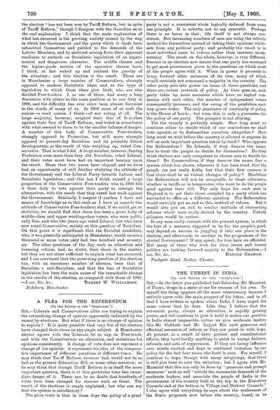A PLEA FOR THE REFERENDUM.
[To THE EDITOR or THE "SPECTATOR."] SIR,—Liberals and Conservatives alike are trying to explain . the astonishing change of opinion apparently indicated by the recent by-elections. But what if there is no change.of opinion to explain ? It is quite possible that very few of the electors have changed their views on any single subject. A Manchester elector agrees with the Liberals, let us say, on Free-trade, . and . with. the Conservatives on education, and maintains his opinions consistently. A change of vote does not represent a ..change of his opinion : it represents his idea of the compare- . tire importance of different questions at different times. He . may think that Tariff Reform, however bad, would not be so bad: as the. present Education Bill, or some other measure; or he may think that though Tariff Reform is in itself the More important question, there is at tbia particular time less imme- .diate danger of. it.. Theta gall be no .doubt. that hundreaaof votes have been changed for _reasons such as these. The result of the elections is. amply explained ; but who can say that the system is satisfactory ?
The plain truth is that in these days the policy of a great
party is not a consistent whole logically deduced from some one principle. It is eclectic, not to say syncretic. Perhaps there- is no harm in 'that: life itself is not always con- sistent. But increasing numbers of men are tising.the eclectic method for themselves instead of taking their opinions whole- sale from any political party : and probably the result is in most individual cases to reduce, rather than increase, incon- sistency. The result on the whole, however, is very different. Success in an election now means that one party has managed to get most prominence given to the questions on which most of the people agree with it. When in .power it proceeds to bring forward other measures of its own, many of which would certainly not command a majority in the country. The other party gets into power on some of these questions, and there are violent reversals of policy. As time goes on, each party takes up more measures which have no logical con- nexion with each other, the number of independent voters consequently increases, and the swing of the pendulum each way grows wider. The only guarantee of continuity of policy is the House of Lords ; but even this is only a guarantee for the policy of one party. The prospect is not alluring.
Yet the remedy is perfectly simple. How long must we continue either to decide which of our convictions we shall vote against, or to disfranchise ourselves altogether ? How long must we wait before the country is allowed to express its will on each important question taken by itself ? Who opposes the Referendum.? Do Liberals, if they deserve the name, fear to trust the people to decide for themselves ? Do they think electors are only competent to choose men to decide for them ? Do Conservatives, if they deserve the name, fear a system which has shown, wherever it has been tried, that the people are not really fickle, but that their first concern is that there shall be no violent changes. of policy ? Doubtless the Referendum will not be acceptable to these reformers, whether in tariffs or in temperance, who want to do the people good. against their will. . The only hope for such . men in England is to get their views. accepted by a party which has succeeded to office on a different question. The Referendum would certainly put an end to this method of reform. But it would also put an end to similar methods of obstructing reforms which were really desired by the country. Unholy alliances would. be useless.
Is any man really content with the present system, in which the fate of a measure, supposed to be for the people's good, may depend on success in juggling it into one place in the election, and afterwards to another in the programme of the elected Government ? If any, speak, for him have we offended. But many of those who wish for clear, issues and honest politics are looking forward eagerly to the Referendum.—I








































 Previous page
Previous page